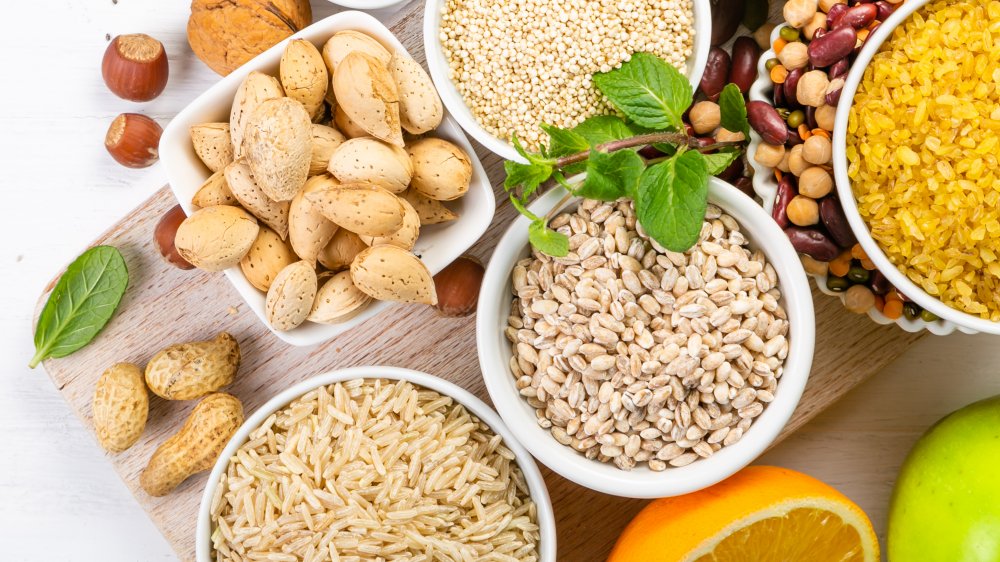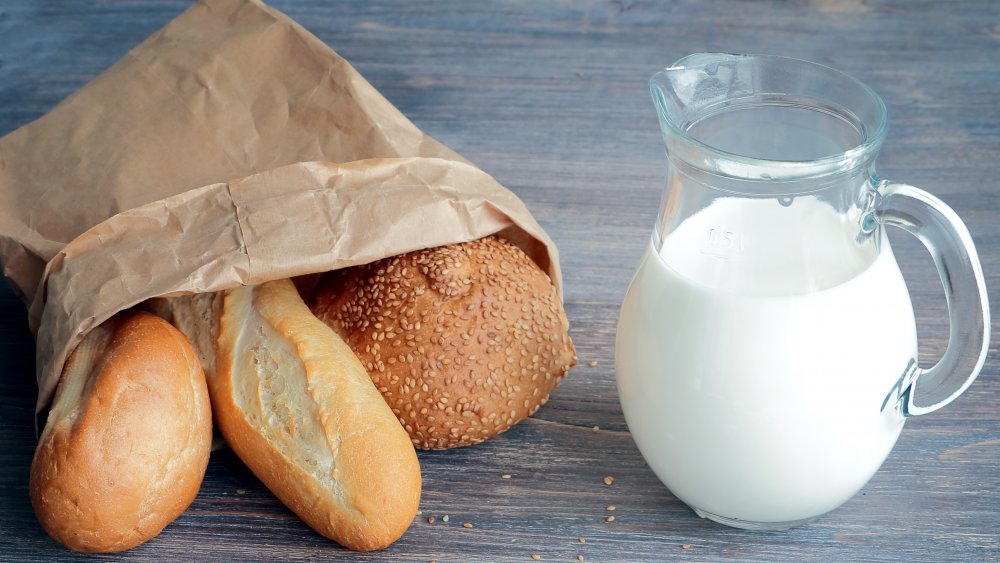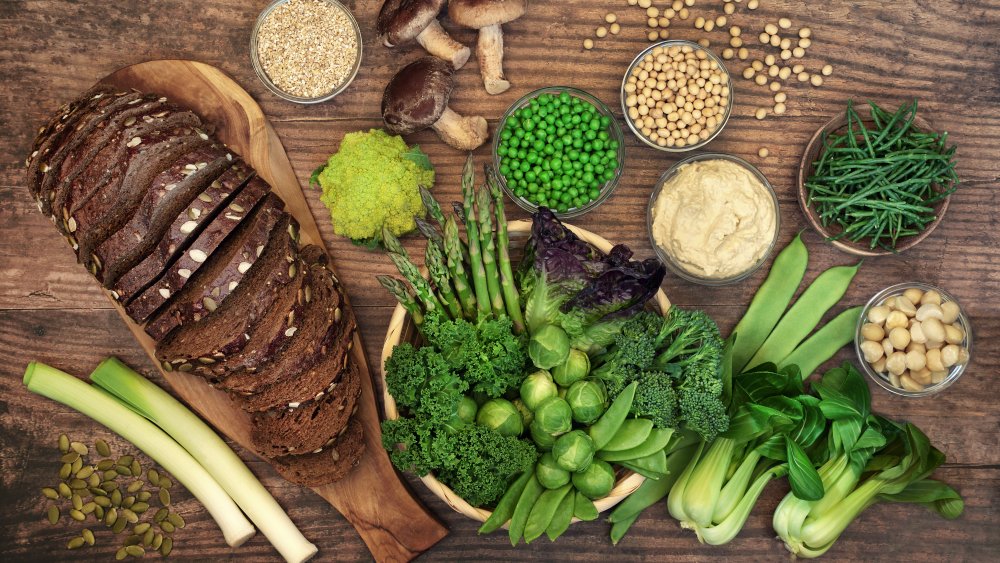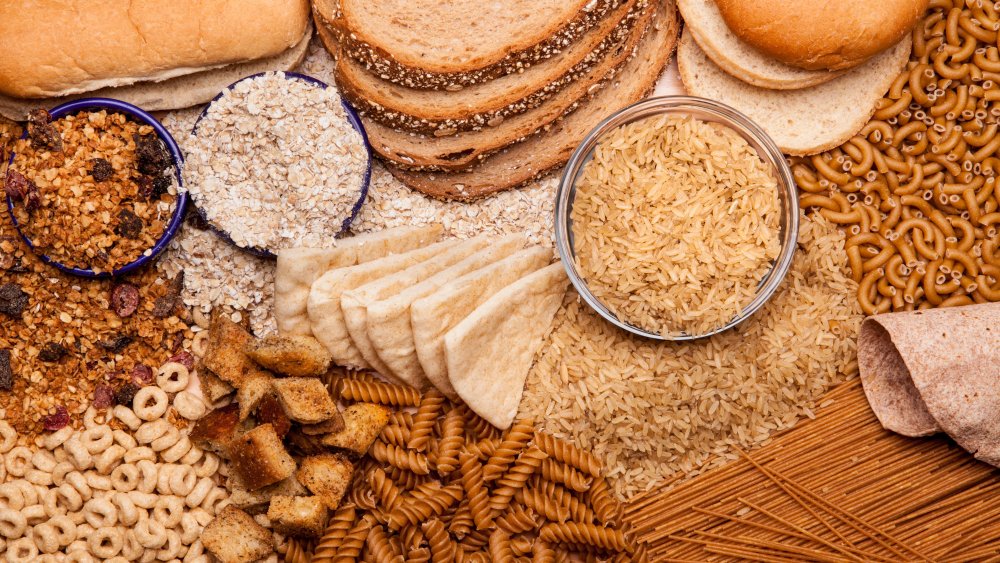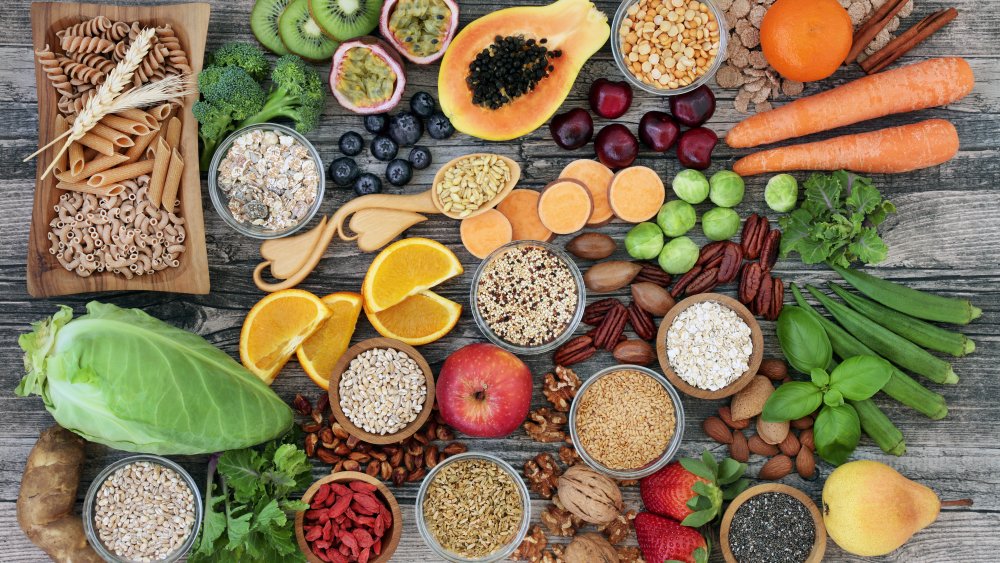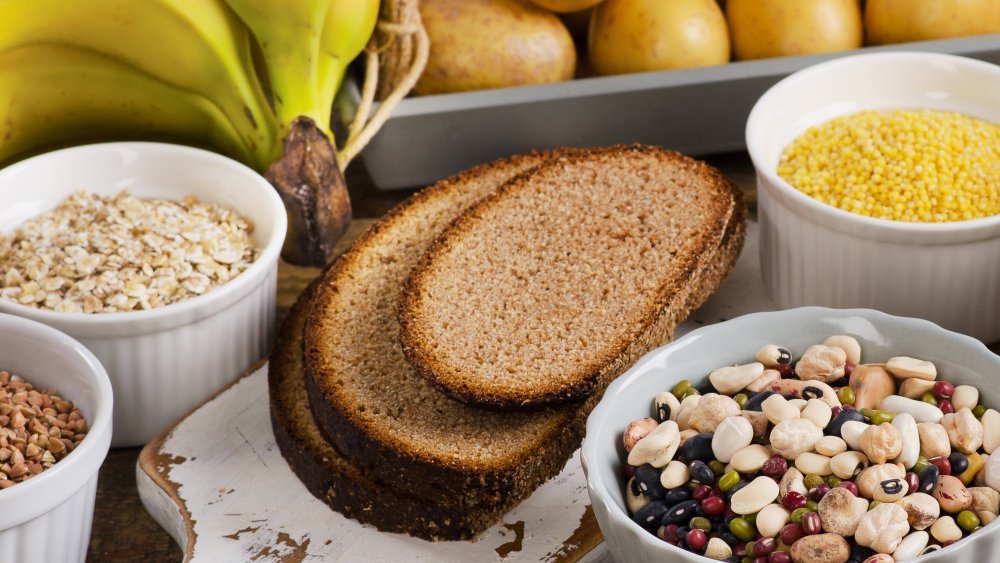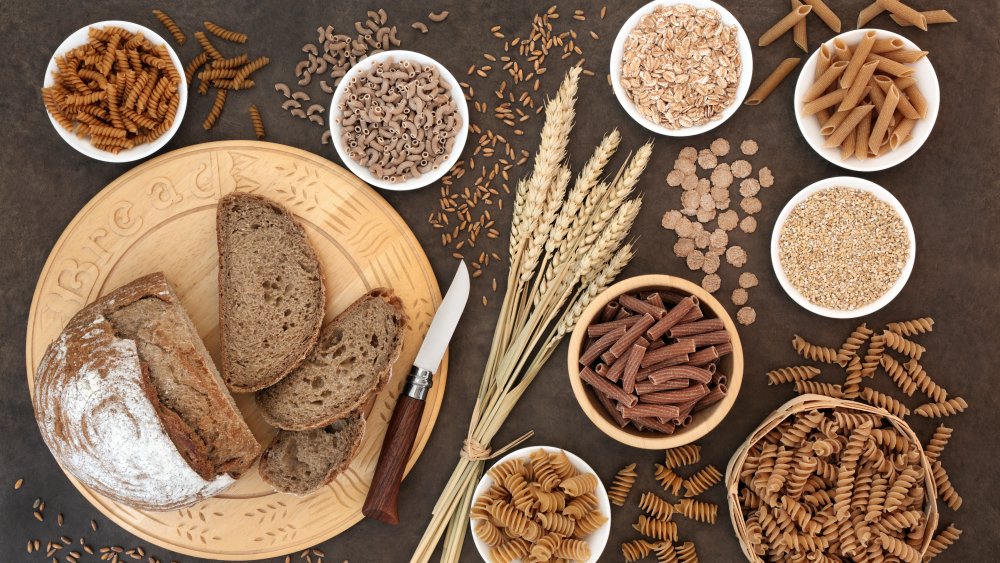Everything You Need To Know About Healthy Carbs Explained
Carbs couldn't possibly be healthy, could they? Even if you're not trying to lose weight, you've probably heard all kinds of vilifying things about carbohydrates. Low-carb diets took root with the Atkins and South Beach diets in the early 2000s, and they've become even more popular with the onset of paleo and keto diets.
Today, despite the fact that the 2015-2020 Dietary Guidelines for Americans recommends eating 45 to 65 percent of your total daily calories in carbohydrates, some weight-loss programs restrict carbs to as few as 5 to 10 percent of daily calories. But that does not mean there's no such thing as healthy carbs.
Fat, protein, and carbohydrates are all interrelated in a nutritional triangle, and you can't get rid of one without increasing the other two. Restrict carbs, and you'll load up on protein and fat; reduce fat, and it's all protein and carbs. Instead of ignoring one of the basic components of our diet, wouldn't it be better to eat a balanced diet that included healthy fats, lean proteins, and complex, unrefined carbohydrates? It's possible — and it all starts with learning everything there is to know about healthy carbs.
Our bodies need carbs
Carbs have been demonized by dieters looking for fast ways to lose weight. It's true that low-carb diets like the keto diet are effective for short-term weight loss, but studies have shown that they're not as practical for sustained weight loss. Why not? Well, our bodies absolutely need carbohydrates to function optimally.
You see, carbohydrates are one of the three major macronutrients — along with fat and protein — that our bodies use to convert calories into energy. Our bodies cannot make these macronutrients, so we must consume them. Each macronutrient contributes to calorie intake; carbohydrates and protein contain four calories per gram, and fat contains nine calories per gram. Considering that our bodies need many calories to function — more or less 2,000 a day, depending on gender, age, and activity level — that's a lot of macronutrients every day!
Paige Smathers, registered dietitian and nutrition therapist, explained in an article for Positive Nutrition that we can't simply skip carbohydrates and load up on the other two macronutrients. Carbohydrates are our body's main source of energy, and they're also the most satiating of the three. It feels good to eat starchy foods, and combining carbs with fat and protein is the best way to create a sense of fullness and satisfaction after a meal.
What foods contain carbs?
Most people picture bread, rice, and pasta when they think of carbs, but you might be surprised to learn that a wide variety of foods contain carbohydrates, including fruits and vegetables.
The 2015-2020 Dietary Guidelines for Americans defines carbohydrates as a source of energy that's made up of fiber, starches, and sugars. Fiber is naturally occurring in plants and is commonly found in fruits, vegetables, and seeds. Starches are also found in vegetables like potatoes and carrots, but they're more commonly associated with legumes or grains like rice and wheat. Finally, sugars can be naturally occurring (like in fruits or dairy) or added to food and beverages during processing.
That means carbs can be found in processed foods that contain added sugars or starches (like soda, candy bars, and cereal) as well as naturally-occurring foods. Even foods that we think of as being rich in protein — like milk — contain carbohydrates.
Not all carbs are considered healthy
There are two major categories of carbohydrates: simple and complex carbohydrates. These categories determine how the body processes the macronutrient and give us a good indication of which carbs are healthier.
Simple carbohydrates come from sugar. Some are naturally occurring (like in milk and fruit), but most of our sources of simple carbs come from processed foods containing added sugar. Our bodies digest these carbs very quickly, providing us with a quick burst of energy that comes from a spike in blood sugar. Unfortunately, that energy doesn't last. If you've ever felt fantastic after eating a sugary dessert only to be greeted by a crash of fatigue, you know what we're talking about.
Complex carbohydrates are more, well, complex. They contain fiber and take longer for our bodies to convert into energy. That means they slowly release glucose into the bloodstream for sustained energy. You'll find complex carbohydrates in whole grains, starchy vegetables, and legumes.
This is why refined carbs aren't healthy
Carbs can be complicated because some complex carbohydrates aren't necessarily healthy. All grains, for example, start out as whole grains, a healthy type of complex carbohydrate. But these grains can be refined to remove the bran and germ. In the case of flour, this improves the shelf life and allows for a finer texture, but the process also removes protein, fiber, vitamins, and minerals. It's easy to identify refined grains if they contain the word "enriched" on the package, meaning that lost vitamins were added back into the product to improve their health profile.
Refined carbs are considered "empty" calories because they don't contain vital nutrients — even if they are enriched. Unlike unrefined complex carbohydrates, they're also digested quickly. Because they cause a spike in blood sugar, they often have a high glycemic index, a value that indicates how quickly a food increases blood glucose levels.
High-glycemic foods have been linked to overeating, so you may find yourself hungry as soon as an hour after eating refined carbs — as opposed to the two- to three-hour feeling of fullness gained from unrefined carbs.
Some healthy carbs are more processed than you'd think
The International Food Information Council Foundation's 2020 Food and Health Survey reported that nearly 80 percent of customers perceive whole grains as "healthful" (via Whole Grains Council). Marketing companies definitely take advantage of this perception; there has been a rise in labels boasting whole-grain-approved contents.
The problem is that these labels don't always tell the whole truth. According to Food Navigator, the FDA's labeling rules don't actually create a distinction between whole grains and refined grains. The grain can be milled and separated, removing the bran and the germ. So long as all the edible constituents are added back in and included in similar proportions, the product can be labeled "whole grain," Live Science detailed. But it's misleading, because these products don't actually contain healthy carbs. Even sugary cereals like Lucky Charms qualify under this definition, the publication explained.
Keep from getting fooled by looking beyond that whole grain stamp. Check out the ingredients label to see if the product actually contains hole grains or whether it contains enriched flour. When in doubt, look for the fiber content. If it's low, and the product contains added sugars, it probably doesn't contain healthy carbs.
Low-carb diets aren't much different than other diets
If you're trying to lose weight, it's easy to fall into a low-carb or no-carb diet. These diets promise rapid weight loss by forcing your body to burn fat as energy instead of carbohydrates. While many people do find short-term success with these types of diets, it might not be for the lack of carbohydrates.
Studies have shown that low-carb diets aren't necessarily more effective than high-carbohydrate diets. A 2016 study in the American Journal of Clinical Nutrition followed 17 obese or overweight men consuming a high-carbohydrate diet for four weeks followed by a low-carbohydrate ketogenic diet for four weeks. At the end of the study, they found the subjects lost weight and body fat regardless of the diet, so long as they maintained a calorie deficit.
Liz Wyosnick, a registered dietitian nutritionist, explained on her site that these low-carb diets appear to work so well because of that caloric deficit. Low-carb diets put foods that most of us eat on a regular basis (like pasta and bread) on an off-limits list, so we eat fewer calories than we consume and lose weight. She emphasizes that our bodies are always burning fat, regardless of whether we consume carbohydrates, and we may actually be able to burn fat more efficiently when carbs are consumed.
Your brain functions better after consuming healthy carbs
Healthy carbs are good for the mind. A 2009 study in the journal Appetite compared women following a low-carb diet to women following a "reduced-calorie balanced diet," like the one recommended by the American Dietetic Association. Before and during the study, the subjects were given a mood assessment and several cognitive tests to assess their working memories, memory spans, and attention. The low-carb dieters performed worse on the memory-based tasks, but their memories improved after the reintroduction of carbohydrates.
It makes sense when you consider that the brain consumes about 20 percent of the body's total energy, making it the body's main consumer of carb-converted glucose energy. Any drop in blood glucose levels has a serious impact on the brain's function and its ability to fire neurons. That helps us better understand why people on the keto diet and other extremely low-carb diets report experiencing "brain fog" and difficulty concentrating.
Healthy carbs are linked to healthy gut bacteria
Healthy carbs are not only a good source of energy, they're also an important component of promoting healthy digestion. While other carbs, fat, and protein are digested along the way to the long intestine, fiber (one of the three types of carbs along with sugar and starch) reaches the long intestine intact. Our bodies can't turn fiber into sugar molecules like other types of carbs so it doesn't contribute to energy. Instead, it performs an important digestive function: Soluble fiber soaks up water, slowing the digestion of nutrients and helping us feel fuller for longer, and insoluble fiber helps move food through the digestive system, according to Harvard's The Nutrition Source.
Complex carbohydrates can also help feed our gut microbiome. Melissa Macher, a registered dietitian nutritionist, explained on her site that high-fiber carbs keep the good bacteria alive in our digestive tract. These beneficial bacteria help "keep our gastrointestinal tract healthy and act as an immune barrier to harmful bacteria that can make us ill."
Healthy carbs are important for your overall health
Carbohydrates not only provide our bodies with energy, but they can also help to improve our body's overall health. It's worth noting that not all carbs contribute to health. The American Heart Association warns that foods high in simple carbohydrates and added sugars can raise blood fat (triglycerides) levels, leading to health problems like coronary heart disease, fatty liver, and diabetes. Additionally, Healthline explained that diets high in refined carbs can lead to obesity, type-2 diabetes, increased belly fat, and inflammation in the body.
On the other hand, healthy carbs are nutrient-dense, containing heart-healthy fiber, antioxidants, vitamins, and minerals. When speaking with Sutter Health, Michelle Keh, a registered dietitian at Alta Bates Summit Medical Center, stressed the importance of including "healthful carbohydrates" in your diet. Going carb-free not only removes carbohydrates but eliminates all the nutrients that come with them. So skip the over-processed carbs but be sure to include naturally-occurring carbohydrates found in fruits, vegetables, whole grains, and legumes in your diet.
Consuming healthy carbs may help you live longer
Who wouldn't want to live longer if at all possible? Consuming healthy carbohydrates may just help you get there. It all has to do with the nutrients contained in healthy complex carbohydrates. For starters, healthy carbohydrates, like whole grains, legumes, and fresh produce, help us eat less. Additionally, Tamar Polonsky, assistant professor of medicine at the University of Chicago Medicine, explained that complex carbs "decrease inflammation and help us decrease the risk of plaque buildup in our arteries."
Furthermore, a 2015 study published in JAMA Internal Medicine found a correlation between higher whole grain consumption and lower mortality. Whole grains contain nutrients and phytochemicals that have a beneficial effect on metabolism, antioxidant activity, and inflammation.
The study followed over 120,000 female registered nurses aged 30 to 55 years from 11 states for over three decades, and over 50,000 American male health professionals aged 32 to 87 years from all 50 states for almost 15 years. After combing through the self-reported data, they found the subjects with higher whole grain consumption lived longer.
Healthy carbs are usually found in whole foods
You can certainly memorize all the rules about what constitutes a complex carb and how to identify unrefined carbs, but that sounds like a lot of work. Luckily, there's an easier way. If you focus on consuming whole foods, you'll likely load up on healthy carbs along the way.
Whole foods include any foods that are minimally processed. If it comes in a box or has unpronounceable ingredients on the label, it's probably not a whole food. In general, these foods are found on the outside aisles of the grocery store instead of in the middle aisles. Think: fruits, vegetables, legumes, seeds, nuts, and whole grains.
This means you'll also want to consider skipping the boxed macaroni and cheese with powdered cheese sauce and try making your own cheese sauce with real milk. You'll also want to choose a whole-wheat pasta instead of refined white flour pasta. Better yet, swap in healthy carbs found in quinoa, wild rice, or couscous instead. You can never go wrong by adding fresh fruits and vegetables to your diet, too. Instead of buying high-sugar fruit-on-the-bottom yogurt, for example, buy it plain and add your own fruit.
What are the healthiest carbs?
You now know the healthiest carbs are complex, unrefined carbohydrates, which are generally found as whole foods instead of processed foods — but what are the best ones to eat? Registered Dietitian Jaclyn London told Good Housekeeping that bananas make the list. This fruit can be starchy or sugary, depending on their ripeness. This healthy carb is also a great source of potassium.
If you can get your hands on the gluten-free grain buckwheat, use it in recipes that call for rice or oats, London recommended. Buckwheat noodles are a nutritious swap for refined flour noodles, as you'll benefit from healthy carbs and other phytonutrients and antioxidants. Just because buckwheat is a good substitute for oats, that doesn't mean you shouldn't also be eating oats. They're are a good source of fiber, including a powerful soluble fiber known as beta-glucan. Most types of oats are healthy (including instant-oats, rolled oats, steel-cut oats, and whole oat groats), but it's best to avoid ones with added sugar.
Legumes are also well-balanced with plant-based protein, fiber, vitamins, and minerals. Potatoes are great too as they are filled with beneficial starches and fiber. All potatoes contain healthy carbs, but sweet potatoes contain more sugar, so they're higher on the glycemic index.
It is possible to overdo it on healthy carbs
As with all things, moderation is key when it comes to healthy carbs. These types of carbohydrates have a beneficial impact on the body and they're a valuable source of vital nutrients, including vitamins, minerals, antioxidants, and fiber. But that doesn't mean you should go all out and eat nothing but healthy carbs.
While consumption of healthy carbs doesn't cause as large of a spike in blood sugar (like refined or simple carbs), our bodies still convert these carbs into sugar. Each carb-containing food has a glycemic index load that identifies how slowly or quickly these foods can increase blood glucose levels. Healthy carbs like sweet potatoes are listed high on the glycemic index, so it's important to keep in mind that they can still cause a blood sugar spike — even though sweet potatoes are generally considered a healthy food.
When in doubt, it's best to follow the 2015-2020 Dietary Guidelines for Americans. This guide recommends eating carbohydrates for 45 to 65 percent of your total daily calories. Of course, you'll want to check with your doctor or dietitian for specific guidelines. Every body is different, and yours may require more or fewer carbohydrates.

